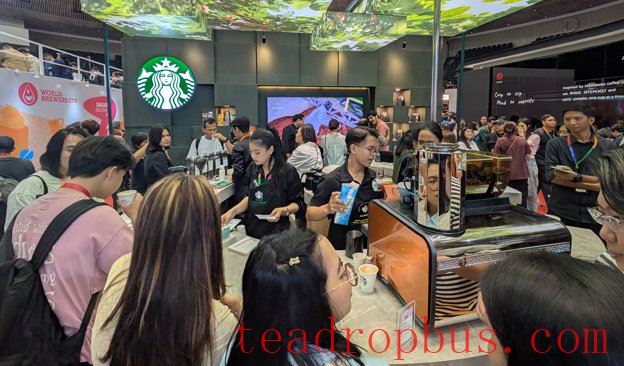
The Starbucks booth at World of Coffee Jakarta was teeming with visitors eager to try a variety of coffees from Indonesia's diverse growing regions. Photo credit: Diana Jendoubi
Starbucks honored Indonesia’s rich coffee heritage at the inaugural World of Coffee Asia in Jakarta this past week. Celebrating a partnership that began in 1971, Starbucks reaffirms its long-standing commitment to giving back to the country that has given it so much over the last 54 years.
The Origin That Started It All
Created in 1971, the iconic Moka-Java blend (featuring a washed coffee from the island of Java) was Starbucks’ first-ever blended coffee. Eleven years later, Howard Schultz tasted a single-origin pour-over from Sumatra that ignited a revolution in American coffee culture. From the very beginning, Indonesia has played a significant role in Starbucks’ journey.
“Indonesian coffee has been deeply woven into our heritage since 1971,” said Chanda Beppu, president of Starbucks Asia Pacific. “Over the years, its rich tapestry of flavors and traditions has shaped nearly 30 of our most treasured Starbucks blends and over 100 unique single-origin offerings from all over Indonesia.”
When asked why Indonesia has always been so important, Starbucks coffee developer Sergio Alvarez told STiR, "Coffee is a product that creates wonder and excitement. The unique flavors and aroma of Indonesian coffee evoke a sense of adventure and exploration. You can always identify a coffee from Indonesia by its distinct characteristics, no matter how it’s processed. Buying some beans from Sumatra or West Java takes you to these fantastic places.”
Domestic and International Recognition
Judging by the massive crowd swarming the Starbucks booth at WOC Jakarta, it's clear that Indonesians adore the brand. In 2023, Starbucks was Indonesia’s highest-selling coffee company, generating $158 million in sales. According to a USDA report, domestic coffee consumption is rising and projected to reach 4.8 million (60kg) bags by 2025. Starbucks currently operates 595 stores in the country, and employs more than 4,400 people throughout the archipelago.
In 2023/2024, Indonesia produced 1.4 million bags of arabica. Starbucks is the largest buyer of Indonesian arabica, purchasing premium-quality beans from Sumatra, Aceh, Java, Bali, Sulawesi, and Flores, making it a key origin in the company’s global portfolio. Starbucks’ signature Sumatra is the brand’s most popular single-origin coffee globally, sold in over 80 countries.
Committed to Supporting Coffee Communities
In a presentation at WOC Jakarta, Roberto Alonso Vega Alfaro, vice president of global Coffee Agronomy, R&D, and Sustainability at Starbucks, discussed the company’s sustainability efforts and commitment to strengthening the coffee production ecosystem.
In Indonesia, over 90% of coffee is grown by smallholder farmers. The Starbucks Farmer Support Center (FSC) in North Sumatra has been helping coffee communities for over a decade by offering access to advanced techniques and practices such as water conservation and improved soil management.
“For us, success means helping farmers improve the quality of life and earn a sustainable income from coffee,” said Masyitah (Ita) Daud, country manager of Starbucks Farmer Support Center in Indonesia. “We are proud to work alongside more than 58,000 Indonesian farms verified under C.A.F.E. Practices, strengthening both livelihoods and a resilient, high-quality coffee supply.”
A vital hub for agronomy research, farmer training, and developing disease-resistant and climate-resilient coffee plants, the FSC helps smallholder farmers improve quality, productivity, and profitability. Starbucks also operates four model farms across the region that demonstrate regenerative practices and act as living classrooms to facilitate climate-resilient practices and improve the livelihoods of coffee communities.
Starbucks supports a seedling donation program that annually distributes around 1.5 million seedlings to farmers all over Indonesia and built 17 water towers that give more than 30,000 people access to clean water.
The company has also partnered with PUR to enact a 50-year reforestation and carbon reduction initiative in Sumatra. The program aims to plant 700,000 trees, including 15,000 native shading tree seedlings annually, to improve soil health, provide crop shade, and promote biodiversity.
Alfaro emphasized that all of Starbucks' research and programs are open to everyone, not just Starbucks suppliers. "The success of our programs depends on the success of the entire coffee industry,” said Alfaro. “The only way to address all of these issues is by working together."
Starbucks honors Indonesia’s role as one of the world’s most celebrated coffee origins, and also highlights the country’s pivotal impact on the company’s long-term global success. It pledges to continue on-the-ground initiatives that help strengthen Indonesian coffee farmers and safeguard both their livelihoods and the future of coffee—ensuring another 50 years of fruitful collaboration.